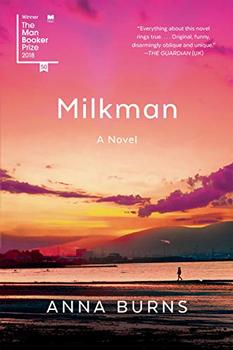Summary | Excerpt | Reviews | Beyond the Book | Read-Alikes | Genres & Themes | Author Bio

This article relates to Milkman
 While frequently framed as a challenging novel, Milkman has resonated with critics and readers alike since the work won the Man Booker Prize in October 2018. Expressing the thoughts of many book reviewers, Ron Charles of the Washington Post branded Anna Burns' third book "the best last novel of [last] year" and "something strange and complex," a throwback to the complicated fiction of modernist titans such as James Joyce and Virginia Woolf. In spite of early fears that the novel would demand too much from casual readers, its sales also have soared, with over 300,000 copies sold in the UK and Ireland. The unexpected winner of the Booker has provoked very little controversy at a time when the prize itself has been facing a high level of public scrutiny.
While frequently framed as a challenging novel, Milkman has resonated with critics and readers alike since the work won the Man Booker Prize in October 2018. Expressing the thoughts of many book reviewers, Ron Charles of the Washington Post branded Anna Burns' third book "the best last novel of [last] year" and "something strange and complex," a throwback to the complicated fiction of modernist titans such as James Joyce and Virginia Woolf. In spite of early fears that the novel would demand too much from casual readers, its sales also have soared, with over 300,000 copies sold in the UK and Ireland. The unexpected winner of the Booker has provoked very little controversy at a time when the prize itself has been facing a high level of public scrutiny.
The bulk of recent criticism of the Booker has risen in response to a 2014 rule change. The Man Booker Foundation, by its own admission, "expanded in 2014 to allow writers of any nationality, regardless of geography, to enter the prize providing that they are writing in English and published in the UK." Prior to the change, only writers from Britain, Ireland and the Commonwealth (a group of 53 countries/nation states united as allies, many of which were once under British colonial rule) could compete.
Since 2014, longlists and shortlists have featured a growing number of American writers; Americans comprised half of the 2017 shortlist, and since 2014, have penned two out of the five winning novels: Paul Beatty's The Sellout in 2016 and George Saunders' Lincoln in the Bardo in 2017.
Many high-profile critics have commented on what they perceive to be the Americanization of the Booker. Last year, around thirty editors signed an open letter to the Man Booker Foundation urging it to stop considering Americans for the prize, lest they create a "homogenised literary future," in which only American voices are amplified and awarded. The Folio Academy, a foundation seeking to celebrate "daunting" fiction by any author writing in English, has concurred; 99% of its members, including Margaret Atwood and Zadie Smith, have requested that the Booker revert to spotlighting only the works of British, Irish and Commonwealth writers.
The concern is understandable, since a substantial boost in sales and reputation accompanies being long or shortlisted for the Booker. The Man Booker Foundation prides itself on the so-called "Booker effect," the organization's "ability to bring books to the public's attention." The competition has historically benefited writers from the 53 countries of the British Commonwealth and Ireland, providing them with well-deserved publicity and greater critical attention. With a disproportionate number of Americans occupying slots on Booker longlists and shortlists, there's less room for those writers to receive much-needed career bumps.
Many booksellers, critics, and writers have agreed that public interest in the Booker has been waning since the Foundation started to include Americans. Even in America, the move seems to have lessened the impact of the award based on sales figures from Nielsen BookScan US. In early 2018, after two years of Americans consecutively winning the prize, Philip Jones of The Bookseller reported that, "[t]hough there is still a considerable Booker bump immediately after the winner is announced, the percentage increase in sales driven by the win is becoming more shallow."
With Northern Irish writer Anna Burns's win, public frustration toward the Booker has subsided. Inventive, smart and underappreciated at the time of its initial release, Milkman is exactly the kind of novel that benefits most from the Booker effect. The Man Group announced in late January that it would end its corporate sponsorship of the Booker and Booker International Prizes in 2019. Just a few weeks later, it was announced that Silicon Valley billionaire, philanthropist and author Michael Moritz and his wife Harriet Heyman's charitable foundation would be the new sponsors. The Crankstart foundation has committed to an initial five-year funding term, with an option to renew for a further five years. It will not give its name to the award, which will be known simply as the Booker prize. Many critics likely hope that the new sponsor will revert to the old rules while also reimagining the prize for years ahead.
Man Booker Prize trophy, courtesy of BBC News
Filed under Books and Authors
![]() This article relates to Milkman.
It first ran in the March 6, 2019
issue of BookBrowse Recommends.
This article relates to Milkman.
It first ran in the March 6, 2019
issue of BookBrowse Recommends.
The single biggest problem in communication is the illusion that it has taken place
Click Here to find out who said this, as well as discovering other famous literary quotes!
Your guide toexceptional books
BookBrowse seeks out and recommends the best in contemporary fiction and nonfiction—books that not only engage and entertain but also deepen our understanding of ourselves and the world around us.